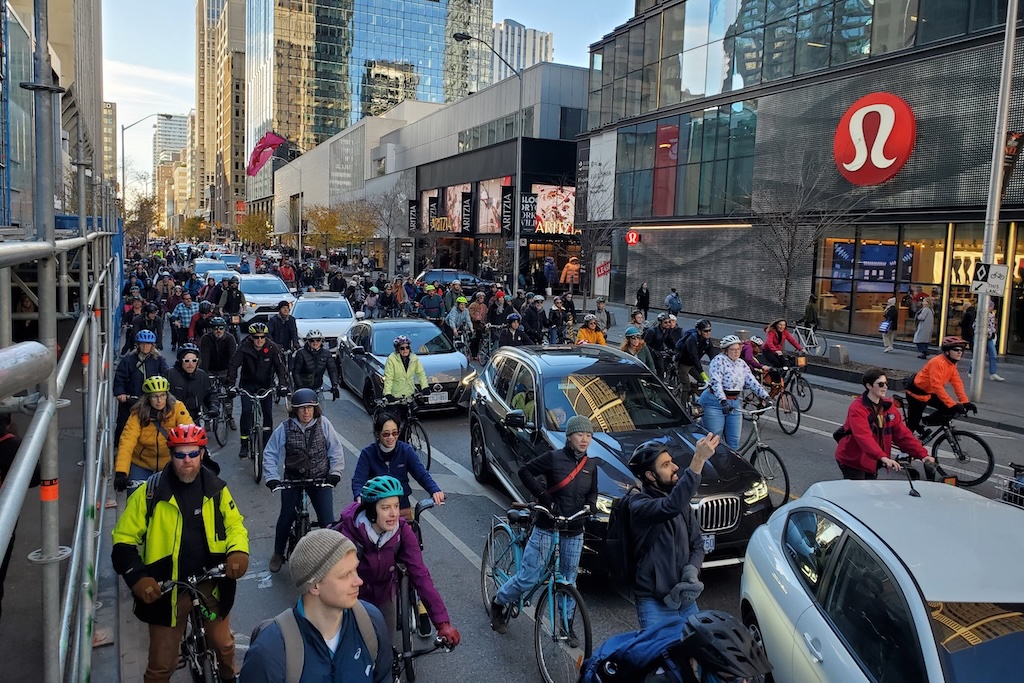Autumn Gear Guide
Find inspiration in our Gear Guide that will keep you out on your bike through wind or rain.
Download NowOn the back foot since Ontario Premier Doug Ford announced that his government would not only curtail future bike lane expansion but actually rip up millions of dollars in cycling infrastructure in the city of Toronto, the local cycling community has responded in an incredible fashion with protests, critical mass rides and even art projects. […]
On the back foot since Ontario Premier Doug Ford announced that his government would not only curtail future bike lane expansion but actually rip up millions of dollars in cycling infrastructure in the city of Toronto, the local cycling community has responded in an incredible fashion with protests, critical mass rides and even art projects. Now, it’s getting serious. Local advocacy group Cycle Toronto has announced a legal challenge to the government’s controversial Bill 212 — Reducing Gridlock, Saving You Time Act, 2024.
Cycle Toronto is joined by individuals Eva Stanger-Ross and Narada Kiondo in the lawsuit. The group argues that the Bill 212, which mandates the removal of protected bike lanes in Toronto, puts cyclists’ lives at risk and violates their Charter rights.
“Bill 212 puts lives at risk. It is not about tackling congestion, working with municipalities for data-driven solutions, or giving people more transportation options,” said Michael Longfield, Executive Director of Cycle Toronto. “It is unprecedented jurisdictional overreach undermining local democracy that will cost taxpayers millions of dollars and jeopardize the safety of cyclists.”
The lawsuit, supported by lawyers from Ecojustice and Paliare Roland LLP, wants an injunction that would stop the removal of critical bike lanes on some of Toronto’s busiest streets, including Bloor Street, University Avenue, and Yonge Street. The challenge claims the law’s broad power to override municipal decisions and remove existing infrastructure is a dangerous precedent that could jeopardize not just Toronto’s bike lanes but others across the province.
The Ontario government argues that the removal of these bike lanes will help ease traffic congestion and that cyclists can use alternative routes. However, there is little evidence to support these claims, and the proposed secondary routes do not exist. Research has shown that separated bike lanes, such as those on Bloor, University, and Yonge, are not only safer for cyclists but also have minimal impact on vehicle traffic flow.
For Eva Stanger-Ross, this isn’t just a legal matter; it’s a fight for her personal safety.
“I bike to school every day. Most of my trip is along the separated bike lanes that the Ontario government plans to rip up. This puts my safety, and the safety of countless other commuter bikers at risk,” Stanger-Ross said. “Without those protected lanes, drivers don’t think about the cyclists they’re sharing the road with. I’ve launched this case along with my co-applicants because our safety should be the government’s top priority. Bike lanes save lives.”
The government’s position on liability is particularly concerning. Bill 212 includes provisions that shield the government from lawsuits if someone is injured or killed as a result of the bike lane removals — an implicit acknowledgment of the safety risks that will likely follow the changes. The City of Toronto has estimated that the cost of removing these lanes will be $48 million.

Toronto bike lane protest (photo @BikeLaneDiary)
Narada Kiondo, a bike messenger and food delivery worker, is also deeply concerned about the impact of Bill 212 on his livelihood and safety.
“I’m part of this case because I use the bike lanes on Yonge, University, and Bloor every day for work – there are no alternative routes that ensure that I can do my job as a bike messenger and food delivery worker, safely and efficiently,” Kiondo said. “I’m worried that if the government is allowed to remove these safe, accessible bike lanes, I’ll be more likely to get into accidents with cars and get seriously hurt. Bill 212 puts my life and the countless other bike messengers and delivery bikers in Toronto, at risk.”
Legal experts are also critical of the bill. Bronwyn Roe, an Ecojustice lawyer, described the legislation as “arbitrary and dangerous.” She argued that it violates the Charter’s section 7 rights, which protect the right to life and security of the person.
“Countless studies show that bike lanes save lives. Removing them, without replacement routes in place and with no evidence that doing so will address traffic concerns, locks in irresponsible car-dependence and is not in the best interest of communities,” she said. “We are challenging Bill 212 and the removal of bike lanes in Toronto because the Ontario government cannot be allowed to put the lives of Toronto cyclists and Ontarians at risk.”
As the challenge progresses, the eyes of cyclists and urban planners across Ontario will be on the outcome, as it could set a precedent for the future of bike lane infrastructure and the role of provincial governments in local transportation decisions. In the meantime, the local cycling community will continue to pressure Ford and his SUV-loving suburban government to kill the bill.
All photos by @BikeLaneDiary.
Find inspiration in our Gear Guide that will keep you out on your bike through wind or rain.
Download Now
Leave a comment